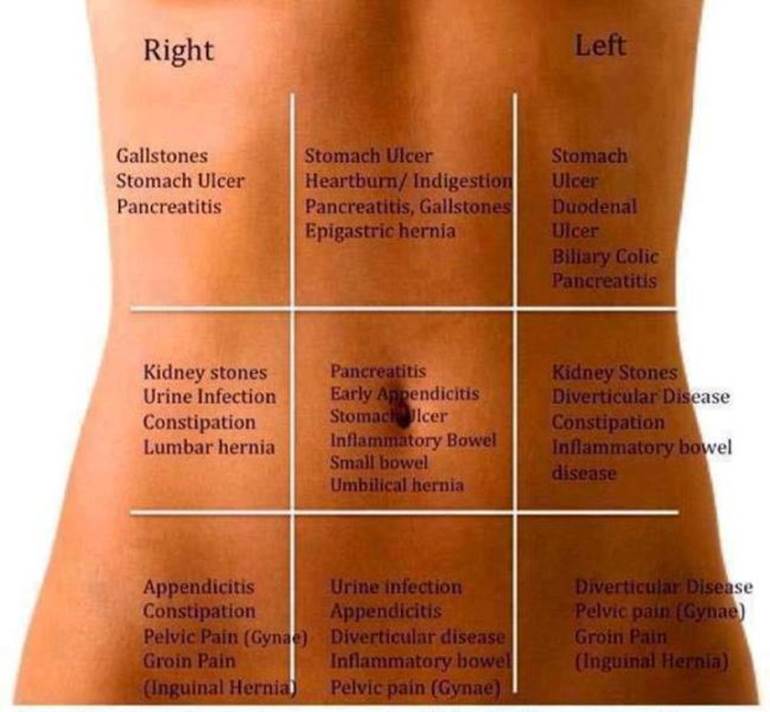Abdominal pain is a very broad term for multiple conditions occurring in the area between the bottom of the ribs and the top of the hips.
ICD-10 Code: R10
Organ dysfunction in the area is the cause. These organs include the stomach, small intestine, colon, liver, gallbladder, spleen, and pancreas.
Examples
- distention of the intestines,
- inflammation,
- a disturbance in the blood flow to the organ
- hyper-motility (excessive) motility of the intestines
- cramping or bowel muscle spasms
Symptoms that can be experienced can include:
- Bloating
- Belching
- Flatulence
- Indigestion
- General discomfort in the abdomen
- Constipation
- Diarrhoea
- GERD (gastro-oesophagal reflux disease)
- Heartburn
Diagnosed on the based on the physical examination, and testing. It is difficult to get an accurate diagnosis and there are many times the cause is misdiagnosed. The characteristics of the pain can change over time, the test often does not show abnormalities and the diseases causing the pain often have similar characteristics and appear to mimic each other.
Referred pain from the ovaries or prostate can complicate the diagnosis.
A common cause of pain include
- Indigestion
- Constipation
- Stomach virus
- Menstrual cramps
- Irritable bowel syndrome (IBS)
- Food poisoning
- Food allergies
- Gas
- Lactose intolerance
- Ulcers
- Pelvic inflammatory disease
- Hernia
- Gallstones
- Kidney stones
- Endometriosis
- Crohn’s disease
- Urinary tract infection
- Gastroesophageal reflux disease (GERD)
- Appendicitis
You should contact your health care professional if the pain is severe or recurrent.
Take these more seriously.
- Fever
- Can’t keep food down
- Dehydration
- Constipation with vomiting
- Frequent or painful urination
- Tender tummy
- Injury to the abdomen
Get immediate medical care if you have these
- vomit blood
- bloody or black tarry stools
- difficulty breathing
- pregnancy pain
If not take the natural route.
You may be suffering from an imbalance in your bacteria in your gut, your microbiota (scientific term) or probiotics for the rest of us.
This is easily fixed by taking a Noster ProBiotic every day. They will load your system with all the good bacteria you need to have a healthy gut.
Taking a Noster ProBiotic every day will alleviate many of the symptoms.
Don’t gamble with your health, protect your immune system, take a Noster ProBiotic every day
References
Budhram GR, Bengiamin RN. Abdominal pain. In: Marx JA, Hockberger RS, Walls RM, et al, eds. Rosen’s Emergency Medicine: Concepts and Clinical Practice. 8th ed. Philadelphia, PA: Elsevier Saunders; 2014:chap 27.
MacGilchrist A, Iredale J, Parks R. The gastrointestinal system. In: Douglas G, Robertson C, eds. Macleod’s Clinical Examination. 13th ed. Philadelphia, PA: Elsevier; 2013:chap 8.
McQuaid KR. Approach to the patient with gastrointestinal disease. In: Goldman L, Schafer AI, eds. Goldman’s Cecil Medicine. 25th ed. Philadelphia, PA: Elsevier Saunders; 2016:chap 132.
Millham FH. Acute abdominal pain. In: Feldman M, Friedman LS, Brandt LJ, eds. Sleisenger and Fordtran’s Gastrointestinal and Liver Disease. 10th ed. Philadelphia, PA: Elsevier Saunders; 2016:chap 11.
Squires RA, Postier RG. Acute abdomen. In: Townsend CM Jr, Beauchamp RD, Evers BM, Mattox KL, eds. Sabiston Textbook of Surgery. 19th ed. Philadelphia, PA: Elsevier Saunders; 2012:chap 47.
Swartz MH. The abdomen. In: Swartz MH, ed. Textbook of Physical Diagnosis. 7th ed. Philadelphia, PA: Elsevier Saunders; 2014:chap 14.

